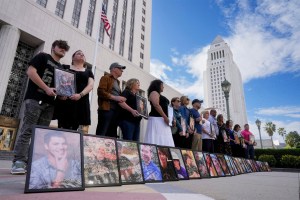
Alexandra Vacroux.
File photo by Stephanie Mitchell/Harvard Staff Photographer
What happens next in Ukraine?
Russian policy expert examines recent deployment of North Korean troops, possible fallout of U.S. elections
The recent deployment of North Korean troops to aid Russia against Ukraine and the weak response from the international community could lead to a potential escalation of the conflict, warned Russian policy expert Alexandra Vacroux.
“The deployment of North Koreans to fight in the war is an escalation of exactly the kind Russia has been warning NATO not to consider, which is to say, ‘Don’t put foreign troops on the ground,’” said Vacroux, executive director of the Davis Center for Russian and Eurasian Studies. Vacroux spoke from Kyiv, where she is spending her academic leave as vice president for strategic engagement at the Kyiv School of Economics.
“And what has been the U.S. response?” she asked. “Well, pretty much so far, the geopolitical equivalent of thoughts and prayers. Secretary of Defense Lloyd Austin had said that this was very, very serious. Apart from that, there has been no reaction.”
During a Monday webinar, Vacroux spoke about the current state of the war in Ukraine as it nears the third anniversary of the Russian invasion and the future of the conflict in the aftermath of the U.S. elections. She called on the U.S. and the international community to help end the war with security guarantees that can deter future Russian aggression against Ukraine. Ukraine’s long-term security is not only in that nation’s interest but also in ours, she said.
“It is in the interest of the United States to defend democratic values and stand up to dictators,” said Vacroux. “You might not care about Ukraine all that much, but if you care about a stable world order, American trade and influence abroad, and about reducing Russia’s influence in American politics, you should be wondering what we can do to help Ukraine negotiate a just and secure conclusion to the war, and be grateful that the Ukrainians are fighting and dying so that we don’t have to.”
The webinar was sponsored by the Davis Center, the Weatherhead Center for International Affairs, and the Program on Negotiation at Harvard Law School.
The conflict is largely taking place in the southern part of Ukraine, where Russia has seized 18 percent of Ukrainian territory and subjugated around 5 million people, she said.
U.S. officials estimate as many as 115,000 Russians have been killed and 500,000 wounded so far. And they put Ukrainian casualties at more than 57,500 killed and 250,000 wounded.
The situation may get worse as Russia has intensified drone and missile attacks against Ukraine. Citing Ukrainian President Volodymyr Zelensky, Vacroux said that Russia this past week launched 900 guided aerial bombs, 500 drones, and 30 missiles against Ukraine.
“Apartment buildings are being hit regularly, and particularly in the East, in Kharkiv, for example, and civilians in Kherson, which is in the south, report that they’re being chased in the street by armed drones,” said Vacroux, who spent part of this past Sunday in her closet during a five-hour Russian air raid and drone attack.
Ukraine’s incursion into Russia’s Kursk region in August managed to bring the war to Russia, and even though the territory taken was small, the offensive had an important symbolic value, said Vacroux.
It is unknown what effect the North Korean deployment ultimately may have. That nation has been providing artillery shells to Russia since 2022, noted Vacroux.
Vacroux also discussed the potential impact of the U.S. elections on Ukraine’s support. American funding is critical for Ukraine to keep fighting against Russia. Congress appropriated more than $113 billion to support the country’s response efforts, and so far, the U.S. has sent more than $60 billion in military and humanitarian aid to help the embattled country.
Former President Donald Trump has said that he views Ukraine as mainly Europe’s problem, which could affect future U.S. funding if he becomes president. If Vice President Kamala Harris wins, the situation may look more promising for Ukraine, but there are no guarantees if Congress ends up being divided after the election.
In her final remarks, Vacroux praised the resilience of Ukrainian society, and asked for more international pressure on Russia and renewed military and diplomatic efforts to ensure Ukraine’s long-term security.
“Ukraine will only stop fighting if it can be sure that Russia will stop fighting and not use a ceasefire to rearm and reattack where the world has moved on,” said Vacroux. “Ukrainians are resilient but exhausted, and many people have been displaced more than once … They’re very strong … they’re very motivated, but the stress and the trauma of the past three years are so deep. More than 80 percent of Ukrainians have lost someone that they loved in the war … It’s amazing that they continue getting up, going to work, and fighting for their country in whatever way they can.”




